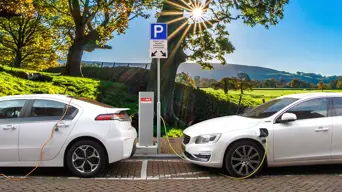'Lost year': electric car sales go into reverse in Germany
After years of growth, demand for battery-powered cars lost momentum as the German economy has struggled and key subsidies were withdrawn.

Electric car / Pixabay: Joenomias 3117778 1280
BERLIN - Sales of new electric vehicles in Germany plunged last year, official figures showed Monday, as a slow switch to battery-powered cars deepened the woes of the country's flagship auto industry.
Just 380,609 EVs were registered in 2024 in Europe's largest auto market, 27.4 percent fewer than in the previous year, the KBA federal transport authority said.
After years of growth, demand for battery-powered cars lost momentum as the German economy has struggled and key subsidies were withdrawn.
The slump in EV sales amounted to a "lost year for electro-mobility", said EY analyst Constantin Gall.
The sudden end of the support programme in 2023 amid a government budget crisis had led to "massive uncertainty among potential buyers", he said.
High prices for new EV models, patchy charging infrastructure and range limitations were putting off new buyers, he said.
The drop in EV sales led an overall decline in the German car market, which has struggled to recover since the coronavirus pandemic.
Some 2.8 million new cars were sold in 2024, one percent fewer than in the previous year.
INDUSTRY STRUGGLES
Weak demand for new cars at home has compounded the challenges facing Germany's auto industry, alongside high production costs and rising competition from China.
Europe's biggest carmaker Volkswagen announced a deal with unions at the end of last year to reduce production capacity in Germany by some 730,000 units and cut 35,000 jobs.
The drastic cuts were needed to put the core Volkswagen brand on a sustainable footing and to fund investments in the manufacturer's struggling electric strategy, the group said.
The outlook for the crisis-hit sector was not much better, with the wider German economy seemingly in stagnation.
"2024 was a bad year for cars and there is a fear that 2025 will not really be any better," Gall said.
The slump in electric car sales in Germany saw battery-powered vehicles lose market share relative to traditional combustion engines and hybrid cars.
Electric cars made up 13.5 percent of sales in 2024, down from 18.4 percent in the previous year.
Sales of hybrid cars rose by 12.7 percent to almost 950,000 as consumers looked to hedge their bets with cars than can run on both electricity and fossil fuel.
SUBSIDY SCHEME
Gall said "strong impulses" were needed to kickstart the electric car market.
A new support programme could provide a "significant boost" to sales of battery-powered cars, he said, but remained uncertain about the outlook as Germany is headed for new elections on 23 February.
Chancellor Olaf Scholz, whose government scrapped the previous subsidy scheme, has called on the campaign trail for a new subsidy scheme on the European level.
Opposition politicians have also called for the ailing auto industry to get more assistance, while criticising European plans to phase out combustion engines.
Manufacturers could cut prices themselves as they look to shift more EVs and stay on track to meet stricter EU emissions targets coming into force in 2025, Gall said.
Progress in bringing down EV prices could lead to a rise in sales, but the sector would struggle to rise above volumes seen in 2023, he said.
A "hoped-for paradigm shift" in consumer preferences had yet to take place, Gall added. "For large parts of the population, combustion engines remain significantly more popular than electric cars."